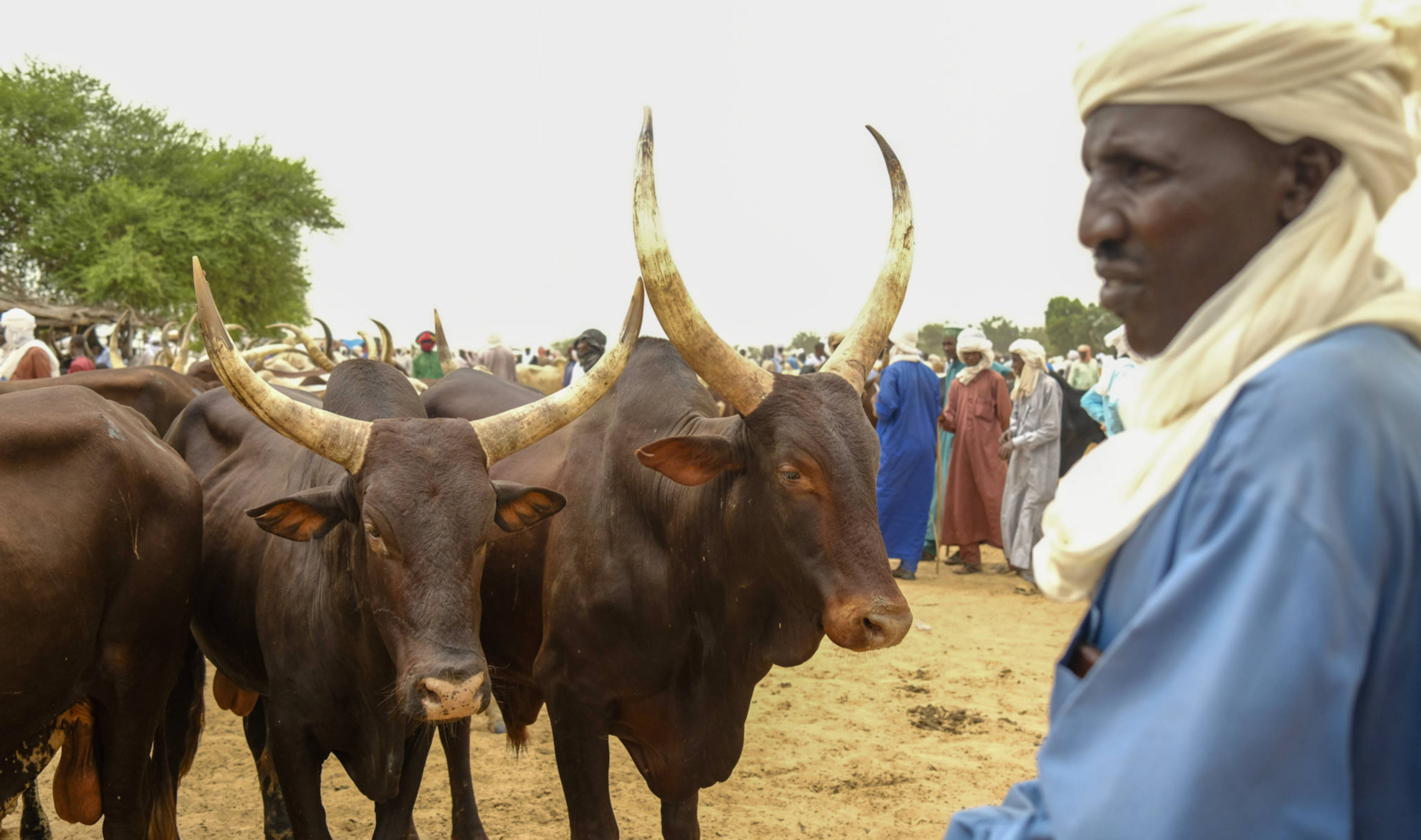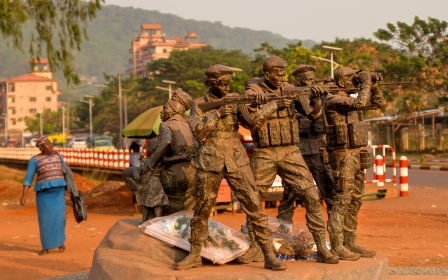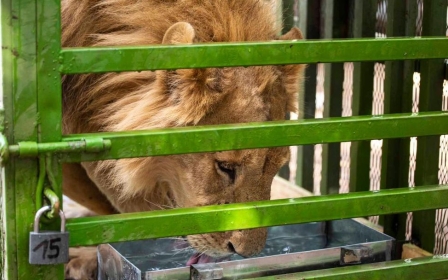Chad replaces Sudan as regional meat exporter as war strangles sector

Green bottle flies buzz around sheep, mutton and goat hides at an artisanal tannery in the Chadian town of Dourbali. Animal skins hang on a string, waiting to dry in the blazing sun before being dipped into small pools of water mixed with either Acacia flowers, salt or bird droppings.
Located roughly 100 kilometres from the capital of N’Djamena, the tannery was refurbished with the help of the Ministry of Commerce and foreign donors about three years ago. But after they ran out of chemicals and industrial products that would help them to produce more, and better quality leather, their production and profits plummeted.
“We need to export outside of the region and access other markets,” Souleyman Bello, the 38-year-old president of the tannery, told Middle East Eye.
Dijmie Issa, a 42-year-old woman who works at the tannery, said the work they’re currently doing is just about enough for survival, but if they had investments, they could help them export and lead a thriving business.
But now, because the war in Sudan has opened up the meat processing market in Chad, workers like Issa and Bello will soon produce for export.
Stay informed with MEE's newsletters
Sign up to get the latest alerts, insights and analysis, starting with Turkey Unpacked
Wedged between conflict-ridden Sudan, a destabilised Niger recovering from a recent coup, a volatile Libya, the Central African Republic, which hosts a significant presence of Russia's Wagner troops, and Cameroon and Nigeria combating Islamist militant infiltrations in the north, Chad has so far remained relatively stable.
However, observers are warning that the country is also facing a host of challenges that may lead to yet another collapse in the Sahel region.
Still, situated amidst some of the world’s most urgent geopolitical challenges, Chad has become an attractive spot for foreign investors.
One has been Arise Integrated Industrial Platforms (Arise IIP), an organisation created as a public-private partnership to develop its meat processing industry. This includes building slaughterhouses or tanneries like the one in Dourbali to help local workers, herders and suppliers access international markets.
Sudan's strangled exports
Before war broke out in Sudan in April, the country held a prominent position as a major African exporter of cattle and processed beef. But the eruption of violence between the Sudanese army and the Rapid Support Forces (RSF) has strangled exports of key goods like meat.
Livestock contributes to more than 25 percent of Sudan’s export revenues and over 20 percent of its GDP, according to Sudan’s Animal Production Research Center.
However, in June, local Sudanese media also reported that markets around Sudan are “witnessing a noticeable recession and a rise in prices” of livestock and meat because of the fighting, adding that the al-Fasher South market in the North Darfur capital is out of livestock due to repeated armed robberies.
The United Nations’ Food and Agriculture Organization (FAO) drew attention last month to an expected rise in animal disease outbreaks due to the lack of veterinary services and vaccines, which could “lead to significant livestock losses, and potentially ripple into a decline in meat and milk consumption, driving up malnutrition rates among children”.
Sudan’s conflict has created a supply shortage in neighbouring Egypt, one of the main importers of Sudanese meat.
The security situation has impacted the beef supply and made meat prices soar in Egypt. This has pushed Cairo to look into additional suppliers for cattle, including Somalia and Chad, according to the US Department of Agriculture.
Trade relations between Egypt and Sudan have expanded since 2018, especially in the sectors of livestock and agricultural products, per the Sudanese Investment Corporation. But Sudan's exports to Egypt experienced a decline, decreasing from $469m in 2018 to $364m in 2020 amid the Covid pandemic. During the initial half of 2021, exports fell to approximately $300m, with livestock contributing to nearly half of this total.
But following the start of the Sudanese civil war in 2023, exports from the Khartoum region stopped. The country’s Ministry of Animal Resources and Fisheries said in August it has set up slaughterhouses in other states to export meat.
Meat prices haven’t increased just in Egypt. Last May, the president of the Livestock Owners and Breeders Association in Jordan told a local paper that prices have increased due to a suspension of imports from Sudan.
Opportunity and risks
With more than 120 million head of livestock, Chad has one of Africa's highest cattle populations, trailing closely behind Ethiopia.
An oversaturated local market in Chad makes it an appealing partner for countries like Egypt, which saw a need to diversify its imports after the price shocks caused by the war in Sudan.
"While it’s unfortunate, the war in Sudan opened a new opportunity for us," said Amarpreet Sidhu, director of Laham Chad, the public-private company led by the Chadian government and Arise IIP.
The company seeks to develop the meat processing industry and open doors for export to Middle Eastern countries, particularly Egypt, Kuwait, and the United Arab Emirates, which were previously served by Sudan.
"We started to create policies for industrialisation because there's no valorisation of the economy, and we needed to work on that," said Nicole Ndoubayp, Chad’s deputy director of the Agency for the Administration of Special Economic Zones.
In the southern Chadian town of Mondou, the country’s newest and most modern slaughterhouse has been running since the start of the year. Local butchers dressed in white robes, wearing protective gear and gum boots prepare cuts of meat ready for export.
With over 280 employees, the slaughterhouse is processing about 200 cattle and 400 sheep a day. The slaughterhouse was built by the government for more than $32m as part of its attempt to kickstart the country’s chilled meat industry.
The Mondou abattoir has already exported meat to countries like the Democratic Republic of the Congo and Gabon, preparing to send their first shipments to Egypt and Kuwait.
For Egypt, the exports would help the country ease the effects of the Sudan war on meat prices.
'While it’s unfortunate, the war in Sudan opened a new opportunity for us'
- Amarpreet Sidhu, director of Laham Chad
The Chadian government expects to build five similar slaughterhouses in the next 10 years, which will lie at the centre of the country's new focus on meat exports.
Until now, Chadian exports have relied on individual herders exporting livestock by foot to countries like Nigeria and Cameroon. The herders’ journeys come with serious risks. The costs of exporting live cattle through the border areas, which are teeming with insurgents, are high.
Raids by Boko Haram militants leave herders with no cattle and no money if they don’t choose their routes carefully.
“If there was industrialisation we wouldn’t have to travel to Nigeria by foot to sell our livestock,” said Sahib Alama, a seasoned herder from the centre of the Dourbali meat market.
Herders like Alama told MEE that if they were able to sell their cattle locally they would decrease these risks, but also the costs.
Slaughterhouses like the one in Mondou would allow them to sell cattle and other livestock within the country and get paid more money.
Foreign investors
After fighting broke out in the Sudanese capital of Khartoum, it quickly extended to its western Darfur region, rekindling a long-standing conflict and leading to thousands fleeing into Chad.
The majority of the 800,000 people who fled Sudan sought refuge in Chad, joining the pre-existing 180,000 refugees already residing there.
Now, in Chad, one out of every 17 people within its borders is a refugee, with the United Nations refugee agency reporting that there are more than 420,000 Sudanese refugees currently living in Chad.
But while the turmoil has put pressure on Chad due to the large numbers of refugees, it also has played in its favour economically.
Foreign investors, particularly from Turkey and Saudi Arabia, have shown interest in Chad’s special economic zones, according to Ndoubayp.
The need to process meat domestically and export value-added products has become a priority, and foreign partnerships are playing a crucial role in this transformation.
As Chad embarks on this journey to revitalise its cattle industry, the opportunity arising from Sudan's instability might just turn the tide for a country taking advantage of the geopolitical situation to bolster its economy and industries.
“I want this job to evolve and to industrialise so we can advance in our work,” said Issa, the tannery worker.
Middle East Eye delivers independent and unrivalled coverage and analysis of the Middle East, North Africa and beyond. To learn more about republishing this content and the associated fees, please fill out this form. More about MEE can be found here.







